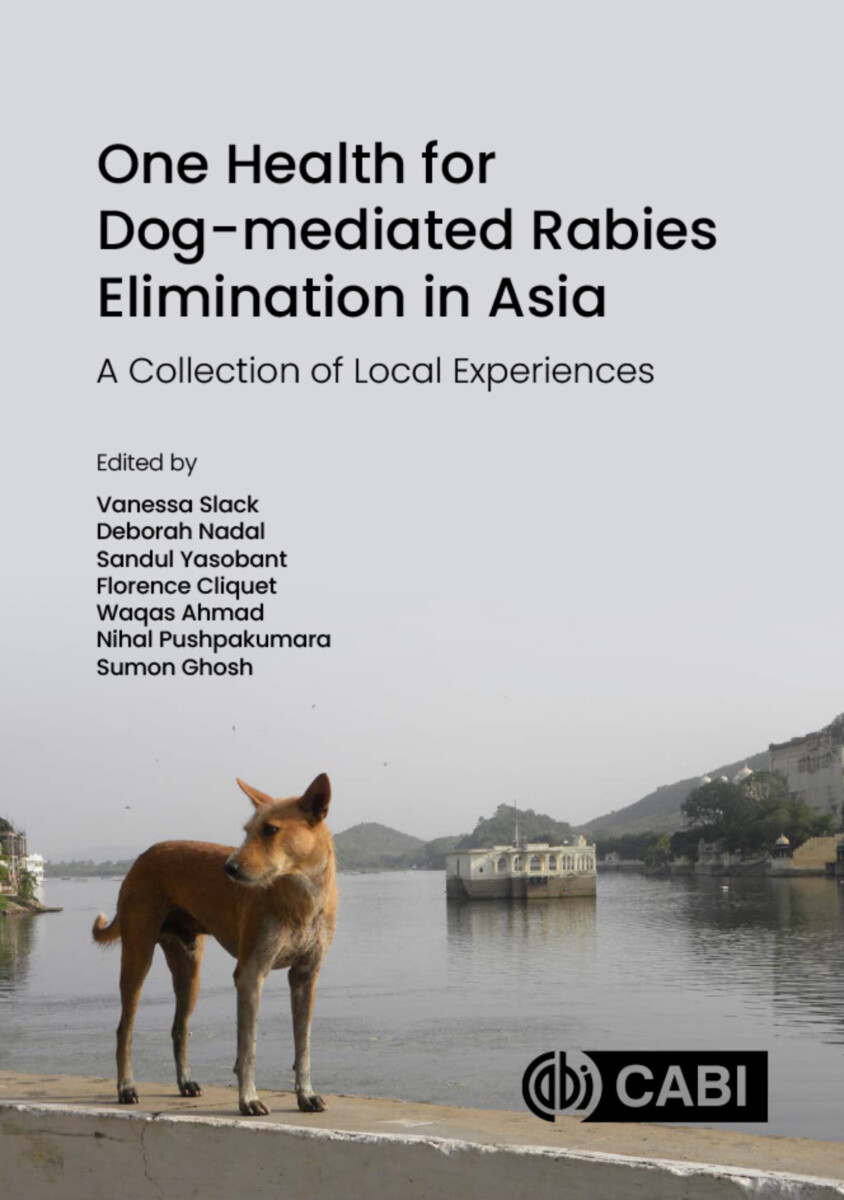One Health for Dog-mediated Rabies Elimination in Asia
A Collection of Local Experiences
- Publisher
CABI - Published
29th August 2023 - ISBN 9781800622951
- Language English
- Pages 248 pp.
- Size 6" x 9"
Although an effective human rabies vaccine has existed since 1885, rabies continues to kill an estimated 59,000 people every year. Sixty percent of these human deaths occur in Asia. The number of animals, especially dogs, who die of rabies is uncalculated. To work towards the global target of eliminating dog-mediated human rabies deaths, the rabies community is applying the One Health approach by jointly focusing on humans and dogs.
Written by a multidisciplinary group of scholars and rabies control program specialists, this book is a collection of experiences and observations on the challenges and successes along the path to rabies control and prevention in Asia. The book:
- grounds chapters in solid scientific theory, but retains a direct, practice-focused and inspirational approach;
- provides numerous examples of lessons learned and experience-based knowledge gained across countries at different levels of rabies elimination;
- brings together and highlights the practices of a strong, international rabies network that operates according to the One Health concept.
Vanessa Slack
Vanessa Slack holds a BS in Zoology from Northern Michigan University and an MPH in Epidemiology from the University of Colorado Anschutz Medical Campus. Since 2018, she has analyzed and mapped surveillance data from animal rabies cases and human exposure risks in Colorado and Texas. She then worked as a Zoonosis Control Program Specialist at the Texas Department of State Health Services with a focus on rabies case investigations and the Oral Rabies Vaccine Program along the Texas-Mexico border. She is currently working at the University of Michigan as an Associate Research Laboratory Technician conducting statewide disease surveillance through wastewater monitoring.
Deborah Nadal
Deborah Nadal holds a BA in South Asian Studies and an MA and PhD in Cultural Anthropology. The book that resulted from her PhD research, titled "Rabies in the Streets. Interspecies Camaraderie in Urban India" (2020, Penn State University Press), has won the English Language Book Award in the Social Sciences at the International Convention of Asia Scholars, and an Honorable Mention from the New Millennium Book Award Committee of the Society for Medical Anthropology of the American Anthropological Association. She then received a Marie Sklodowska-Curie Fellowship from the European Commission for a postdoctoral research project on rabies at the Institute of Biodiversity, Animal Health and Comparative Medicine of the University of Glasgow, UK, and the Center for One Health Research of the University of Washington. Currently, she teaches and does research on multispecies health at the Department of Humanities of Ca' Foscari University of Venice, Italy. She continues to collaborate with the University of Glasgow, and the Department of Control of Neglected Tropical Diseases of the World Health Organization as well, on rabies-related projects.
Sandul Yasobant
Sandul Yasobant has completed his health education and public health training at Utkal University (Odisha) and Sri Ramachandra University (Chennai) in India. He has completed the doctoral program "One Health & Urban Transformation" at the Center for Development Research (ZEF), University of Bonn, Germany, and obtained a public health doctoral degree from the medical faculty, University of Bonn, Germany, in 2020. He holds two prestigious fellowships: Operational Research Fellowship-2015, India, and EBQ- VLIR-UOS Scholar-2016, Belgium. He is currently working as a technical officer (research) at the Indian Institute of Public Health Gandhinagar (IIPHG), India.
Florence Cliquet
Florence Cliquet obtained her PhD in Immunology and Biochemistry at the Université de Lille, in France. She has been working on rabies since 1992. Currently, she is the Research Director of the OIE / WHO / EU Reference Laboratory for rabies, Anses-Nancy Rabies and Wildlife Laboratory, France. She has published more than 200 academic papers, most of them on rabies.
Waqas Ahmad
Waqas Ahmad trained as a veterinarian at the University of Agriculture Faisalabad, in Pakistan, and received his PhD from the Institute of Zoonoses, Jilin University, Changchun, China. He has contributed to about 20 scientific publications. He is currently working as an assistant professor of epidemiology and public health at the University of Veterinary and Animal Sciences, Narowal Campus, Lahore, Pakistan.
Nihal Pushpakumara
Nihal Pushpakumara, BVSc., MSc., MPM., MPhil., trained in veterinary and veterinary epidemiology at the Sri Lanka Institute of Development Administration in Colombo, Sri Lanka and the University of Peradeniya, in Sri Lanka. Since 2016, he has worked as a senior wildlife veterinary surgeon at the Wildlife Veterinary Hospital, Eastern Region, Sri Lanka.
Sumon Ghosh
Sumon Ghosh is a veterinarian working as a Graduate Assistant in the Department of Public Health, University of Tennessee, Knoxville. He worked in the Infectious Diseases Division of the International Centre for Diarrhoeal Disease Research, in Bangladesh (icddr,b). Dr. Ghosh has also been involved in research on rabies with the Directorate General of Health Services of Bangladesh. He has collaborated actively with researchers from diverse disciplines on several projects of public health importance in Bangladesh. His expertise and research interests lie in the realm of infectious diseases, especially emerging and re-emerging pathogens in tropical environments, global health, medical microbiology, disease control, and vaccination. Dr. Ghosh earned his degree in Veterinary Medicine (DVM) from Chittagong Veterinary & Animal Sciences University in Bangladesh and post-graduation (MS) from the same institute. He has received a fellowship from the Danish International Development Agency (DANIDA), Bangladesh as a Post Graduate Research Grant. He was short-listed for the World Rabies Day Award 2019 by the Global Alliance for Rabies Control.


